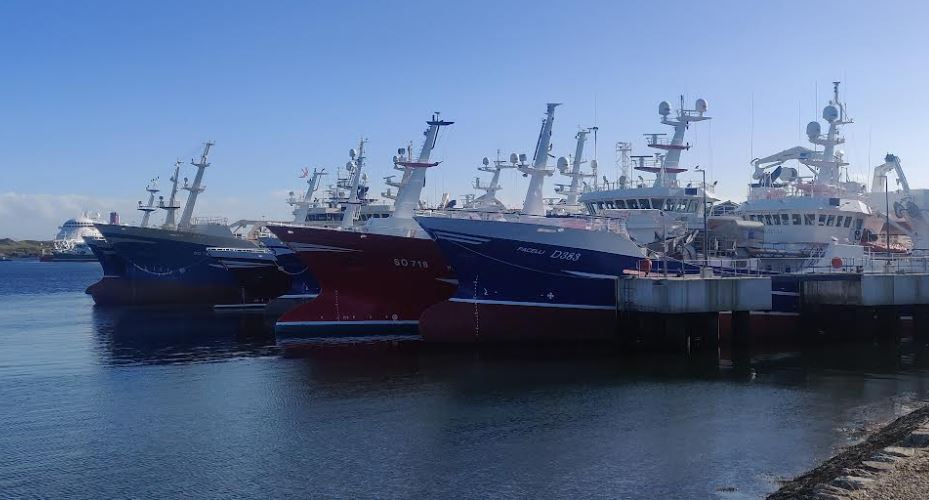Top Stories
EU Fishing Leaders Gather in Killybegs to Combat New Rules

UPDATE: European fishing leaders are converging in Killybegs today as they confront urgent challenges posed by controversial new EU fisheries control regulations. The Annual General Meeting (AGM) of the European Association of Fish Producers Organisations (EAPO) kicks off tomorrow, September 10, 2025, at Ireland’s largest fishing port, with critical discussions set to impact the future of the fishing industry across Europe.
Hosted by the Killybegs Fishermen’s Organisation (KFO) and the Irish Fish Producers Organisation (IFPO), this meeting brings together delegates from 17 Producer Organisations across Europe, including representatives from Ireland, Sweden, Denmark, Belgium, Netherlands, France, and Spain. The stakes are high as leaders debate the implications of new regulations that could threaten the sustainability and economic viability of fish production.
Dominic Rihan, Chief Executive of KFO, warns that the proposed regulations could severely damage the fishing community in Killybegs. He emphasizes the need for controls that are not only robust but also practical, asserting, “Our members want to fish responsibly and keep business here in Ireland, but they need workable rules that reflect the realities of fishing.”
The EAPO’s agenda includes a focus on quotas, controls, and the long-term sustainability of fishing practices. The organization acknowledges that while robust controls are essential for sustainability and food security, they must not be burdensome. Fishing leaders fear the new rules will lead to increased costs and red tape, further complicating compliance and threatening jobs.
The impact of these regulations is already being felt. Recent data indicates a significant drop in foreign vessel landings at Irish ports, with foreign quota landings plummeting by 58%. In a stark illustration of the crisis, almost 39,000 tons of Ireland’s fish quota were landed abroad in 2024, signaling a growing disincentive for foreign fishers to dock in Ireland.
“This system is broken,” declared Aodh O’Donnell, Chief Executive of IFPO. “Our ports should be magnets for landings, but the rules have had the opposite effect. Reform at EU level is urgently needed to restore confidence, competitiveness, and jobs in coastal communities.”
The urgency of this meeting is amplified as 2026 quota negotiations approach, with alarm bells ringing over the “zero catch” advice for key whitefish species and reports of non-EU countries overfishing mackerel. The EAPO will also address the ongoing evaluation of the Common Fisheries Policy and the challenges posed by offshore wind farm developments and the establishment of Marine Protected Areas, which are squeezing available fishing grounds.
Throughout the week, discussions will include engagement with local politicians such as Sinn Féin TD Pádraig MacLochlainn and Fine Gael Senator Manus Boyle. The AGM will also feature insights from Caroline Bocquel, CEO of Bord Iascaigh Mhara (BIM).
As these discussions unfold, the future of the fishing industry hangs in the balance. The Killybegs summit is not just a meeting; it represents a critical moment for the fishing sector’s survival in Europe. Stakeholders are urged to closely monitor developments as leaders work to navigate these pressing challenges.
Stay tuned for more updates as this story develops.
-

 Top Stories2 months ago
Top Stories2 months agoTributes Surge for 9-Year-Old Leon Briody After Cancer Battle
-

 Entertainment3 months ago
Entertainment3 months agoAimee Osbourne Joins Family for Emotional Tribute to Ozzy
-

 Politics3 months ago
Politics3 months agoDanny Healy-Rae Considers Complaint After Altercation with Garda
-

 Top Stories3 months ago
Top Stories3 months agoIreland Enjoys Summer Heat as Hurricane Erin Approaches Atlantic
-

 World4 months ago
World4 months agoHawaii Commemorates 80 Years Since Hiroshima Bombing with Ceremony
-

 Top Stories2 months ago
Top Stories2 months agoNewcastle West Woman Patricia Foley Found Safe After Urgent Search
-

 Top Stories4 months ago
Top Stories4 months agoFianna Fáil TDs Urgently Consider Maire Geoghegan-Quinn for Presidency
-

 World4 months ago
World4 months agoGaza Aid Distribution Tragedy: 20 Killed Amid Ongoing Violence
-

 World4 months ago
World4 months agoCouple Convicted of Murdering Two-Year-Old Grandson in Wales
-

 Top Stories3 months ago
Top Stories3 months agoClimbing Errigal: A Must-Do Summer Adventure in Donegal
-

 Top Stories3 months ago
Top Stories3 months agoHike Donegal’s Errigal Mountain NOW for Unforgettable Summer Views
-

 World4 months ago
World4 months agoAristocrat Constance Marten and Partner Convicted of Infant Murder









